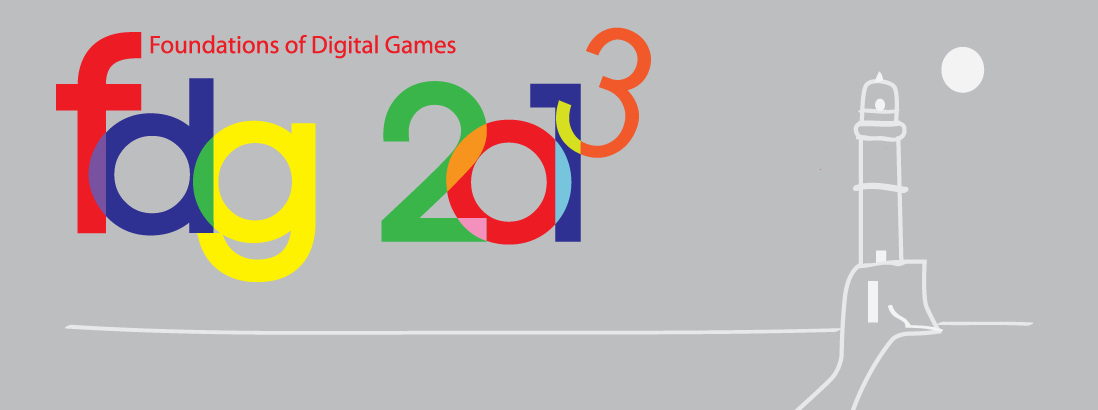
Conference program
FDG 2013 will take place on 14–17 May 2013. For information on the venue and accommodations, see the Attendees page.
All papers are available open-access:
Program (PDF):
Watch remotely:
Workshops
See the workshops page for full information on FDG's workshop program.
Keynotes
The case for releasing the research-based game
While few look to academic researchers for major game releases, or even for cutting-edge indie titles, academia can prove a surprisingly fertile ground for producing innovative games with public appeal. At the same time, the promise of a major public release can provide incentive to students and researchers to produce imaginative and innovative vehicles for sharing otherwise obscure research with the public. This talk tells the story of how I became involved in developing a succession of such games (including NERO, Galactic Arms Race, Picbreeder, and Petalz), all produced almost entirely by students to showcase and investigate cutting-edge artificial intelligence technology, and how these games have been received by the public. The reactions of regular players from around the Internet provide a glimpse into the importance of academic games and their potential for impacting the lives of both their student developers and the players who they ultimately inspire.
 Kenneth O. Stanley is an
associate professor in the Department of Electrical Engineering and Computer
Science at the University of Central Florida. He received a B.S.E. from the
University of Pennsylvania in 1997 and received a Ph.D. in 2004 from the
University of Texas at Austin. He is an inventor of the Neuroevolution of
Augmenting Topologies (NEAT), HyperNEAT, and novelty search algorithms for
evolving complex artificial neural networks. His main research contributions
are in neuroevolution (i.e. evolving neural networks), generative and
developmental systems (GDS), coevolution, machine learning for video games, and
interactive evolution. He has won best paper awards for his work on NEAT, NERO,
NEAT Drummer, FSMC, HyperNEAT, novelty search, and Galactic Arms Race. He is an
associate editor of IEEE Transactions on Computational Intelligence and AI in
Games, on the editorial board of Evolutionary Computation journal, and on the
ACM SIGEVO Executive Committee. He is also a co-founder and the
editor-in-chief of aigameresearch.org.
Kenneth O. Stanley is an
associate professor in the Department of Electrical Engineering and Computer
Science at the University of Central Florida. He received a B.S.E. from the
University of Pennsylvania in 1997 and received a Ph.D. in 2004 from the
University of Texas at Austin. He is an inventor of the Neuroevolution of
Augmenting Topologies (NEAT), HyperNEAT, and novelty search algorithms for
evolving complex artificial neural networks. His main research contributions
are in neuroevolution (i.e. evolving neural networks), generative and
developmental systems (GDS), coevolution, machine learning for video games, and
interactive evolution. He has won best paper awards for his work on NEAT, NERO,
NEAT Drummer, FSMC, HyperNEAT, novelty search, and Galactic Arms Race. He is an
associate editor of IEEE Transactions on Computational Intelligence and AI in
Games, on the editorial board of Evolutionary Computation journal, and on the
ACM SIGEVO Executive Committee. He is also a co-founder and the
editor-in-chief of aigameresearch.org.
Unexpected and unplanned play: Digital games among orangutans
Playing animals may be one of the most entertaining things the web can offer for procrastination, but they are also a viable source of ethnographic insight for the study of games and play. Especially when one gets to observe close-by or actually design for non-humans, an exciting area of strange play behaviour, unusual appropriations and species-specific social play starts to unravel. This talk aims to establish that an orangutan poking a touch screen with their hairy, long fingers can be a valuable asset of self-reflection for game designers and researchers. Despite orangutans' genetic closeness to us humans, they seem to approach technology and games very differently. This, I argue, can benefit designers and researchers alike in understanding what makes human players, what are designers' common, perhaps unintentional demands for our players, and, finally, to recognise the non-cultured, playing animal in us humans.
 Hanna Wirman is a visiting assistant professor at the School of Design of the Hong Kong Polytechnic University, where she is the stream leader for MSc in game development. Her research focuses on identity, gender, co-creativity, emerging audiences and, most excitingly, non-human play. She is interested in how new player groups including non-human animals approach digital games differently from mainstream audiences and invite both innovative design solutions and revisited theoretical approaches. Hanna is interested in non-human animals as users of latest computer technologies and currently builds games for orangutans’ enrichment and for cross-species communication.
Hanna Wirman is a visiting assistant professor at the School of Design of the Hong Kong Polytechnic University, where she is the stream leader for MSc in game development. Her research focuses on identity, gender, co-creativity, emerging audiences and, most excitingly, non-human play. She is interested in how new player groups including non-human animals approach digital games differently from mainstream audiences and invite both innovative design solutions and revisited theoretical approaches. Hanna is interested in non-human animals as users of latest computer technologies and currently builds games for orangutans’ enrichment and for cross-species communication.
Xbox SmartGlass
Xbox SmartGlass is a cross-platform (Windows 8, Windows Phone, iOS, and Android) application that allows for easy connection to an Xbox 360 console, discovery of content, and control of the Xbox. This talk will cover how to create a SmartGlass-enabled title on the Xbox, as well as use the Xbox SmartGlass SDK to develop a corresponding second-screen experience. Learn the details of how you can use the SmartGlass platform to reach a large audience, drive more engagement with your app, and tap into a broad ecosystem.
 Rosa Thomas has been with Microsoft since 2002 and currently works on the SmartGlass Platform SDK. She has held many positions at Microsoft in the areas of Active Directory, Windows Azure, Office 365 Authentication, and Information Protection Services. Prior to Microsoft, Rosa Thomas was a Software Engineer at IBM and Symantec. She graduated from Syracuse University with a dual degree in Computer Engineering and Electrical Engineering.
Rosa Thomas has been with Microsoft since 2002 and currently works on the SmartGlass Platform SDK. She has held many positions at Microsoft in the areas of Active Directory, Windows Azure, Office 365 Authentication, and Information Protection Services. Prior to Microsoft, Rosa Thomas was a Software Engineer at IBM and Symantec. She graduated from Syracuse University with a dual degree in Computer Engineering and Electrical Engineering.







